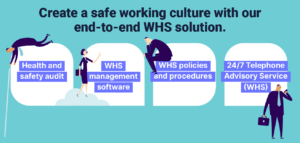By Hannah Hurst
Whether you call it Work Health and Safety (WHS), or Occupational Health and Safety (OHS), both terms refer to the management of risks to the health and safety of everyone within the workplace. Australia’s harsh WHS laws mandate that businesses, or persons conducting a business or undertaking (PCBUs), also known as Officers under WHS law, have a duty of care to ensure the health, safety, and welfare of persons in its workplace, including all staff members, contractors, volunteers, and customers.
In this article, I explore an Officer’s responsibilities and point out if you can be held personally liable for an injury that occurs in the workplace.
Who is an Officer?
Within each business, there are individuals who have decision making authority and management control – they exercise influence over the specific activities and behaviours that determine the success or failure of health and safety initiatives and compliance by the PCBUs with WHS laws. Officers make important decisions on the resources that will be made available for the purposes of work health and safety and the policies that will be developed to support compliance.
As such, WHS law places a specific duty on these individuals to exercise ‘due diligence’. The duty to exercise due diligence, requires Officers to take reasonable steps to support a health and safety culture, accountability, the allocation of resources and the development of appropriate policies.
If an Officer fails to exercise due diligence requirements, they can be held personally liable.
Your duties as an Officer
When determining who may be the designated WHS Officer in the workplace, it useful to consider the following factors:
- Do you own or operate a small business?
- Do you make big decisions about all or part of your business?
- Can your position in the company affect your business’s financial standing?
If you have answered yes to any of these, then you may be a WHS Officer and be charged with the obligations and responsibilities under WHS laws to demonstrate a proactive approach to WHS matters.
As an Officer, you have an expectation and responsibility to ensure that the business protects workers and others against any harm to their health and safety. Officers have duties to:
- Protect their workers;
- Protect other people in the workplace;
- Maintain the workplace and its facilities;
- Minimise the risk and exposure of COVID-19 if reasonably practicable;
- Provide information, training instruction and supervision, and;
- Consult with workers regarding WHS matters relating to COVID-19 or other risks.
To ensure an officer is meeting their duties, they should always:
- Keep WHS knowledge up to date;
- Understand the business and the WHS hazards and risks that may be present;
- Be certain that the business is properly resourced to manage any associated WHS risks, and ensure the resources are being used;
- Have effective reporting processes for incidents, hazards and WHS issues and confirm these processes are being followed.
Workplace injuries and liabilities
The harmonisation of WHS laws in most Australian jurisdictions has changed the environment for WHS Officers. The positive, ongoing duty that rests with Officers to exercise due diligence in meeting health and safety standards does not only arise if an incident occurs; an Officer may be found guilty of an offence under the WHS Act if this due diligence fails to be exercised.
Unless you are a volunteer Officer, you may be prosecuted if you fail to meet your duties as an Officer. This may happen despite there even being an incident within your workplace or if the business hasn’t been held liable. Thus, it is essential that any individual charged with the duties and responsibilities of a WHS Officer within the workplace proactively monitors and evaluates health and safety management within the workplace.
Does your business need support and advice on WHS? HR Assured is more than an outsourced HR service. We’re also experts in WHS and have a suite of end-to-end services that ensure businesses are compliant with Australia’s workplace health and safety laws.
For more information on WHS, clients should contact the 24/7 Telephone Advisory Service.
Not an HR Assured client and need advice about WHS? Contact us today to arrange a confidential, no-obligation chat.
Hannah Hurst is a Workplace Relations Consultant at FCB Group and HR Assured. She regularly provides advice to a wide range of businesses in respect to compliance with workplace laws and has a special interest in the retail industry. Hannah is also a fourth-year law and commerce student at Macquarie University.





